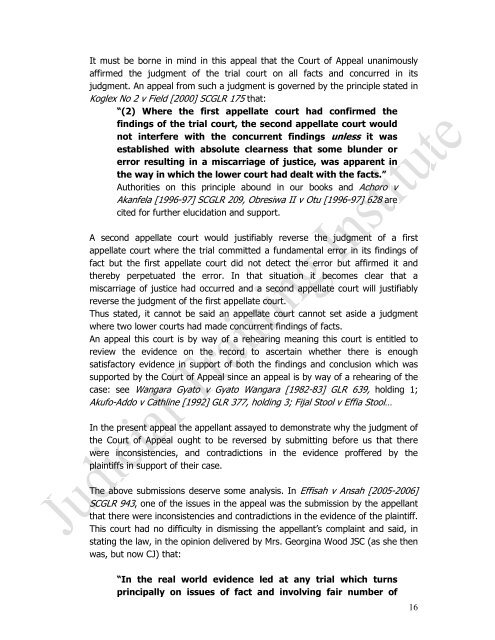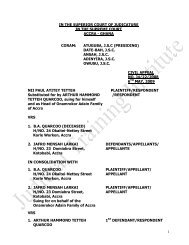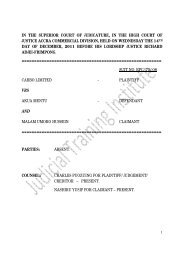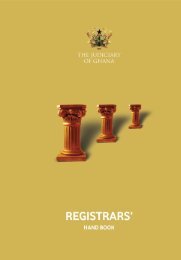AKOSUA DUFIE VRS.pdf - Judicial Training Institute
AKOSUA DUFIE VRS.pdf - Judicial Training Institute
AKOSUA DUFIE VRS.pdf - Judicial Training Institute
Create successful ePaper yourself
Turn your PDF publications into a flip-book with our unique Google optimized e-Paper software.
It must be borne in mind in this appeal that the Court of Appeal unanimously<br />
affirmed the judgment of the trial court on all facts and concurred in its<br />
judgment. An appeal from such a judgment is governed by the principle stated in<br />
Koglex No 2 v Field [2000] SCGLR 175 that:<br />
“(2) Where the first appellate court had confirmed the<br />
findings of the trial court, the second appellate court would<br />
not interfere with the concurrent findings unless it was<br />
established with absolute clearness that some blunder or<br />
error resulting in a miscarriage of justice, was apparent in<br />
the way in which the lower court had dealt with the facts.”<br />
Authorities on this principle abound in our books and Achoro v<br />
Akanfela [1996-97] SCGLR 209, Obresiwa II v Otu [1996-97] 628 are<br />
cited for further elucidation and support.<br />
A second appellate court would justifiably reverse the judgment of a first<br />
appellate court where the trial committed a fundamental error in its findings of<br />
fact but the first appellate court did not detect the error but affirmed it and<br />
thereby perpetuated the error. In that situation it becomes clear that a<br />
miscarriage of justice had occurred and a second appellate court will justifiably<br />
reverse the judgment of the first appellate court.<br />
Thus stated, it cannot be said an appellate court cannot set aside a judgment<br />
where two lower courts had made concurrent findings of facts.<br />
An appeal this court is by way of a rehearing meaning this court is entitled to<br />
review the evidence on the record to ascertain whether there is enough<br />
satisfactory evidence in support of both the findings and conclusion which was<br />
supported by the Court of Appeal since an appeal is by way of a rehearing of the<br />
case: see Wangara Gyato v Gyato Wangara [1982-83] GLR 639, holding 1;<br />
Akufo-Addo v Cathline [1992] GLR 377, holding 3; Fijal Stool v Effia Stool…<br />
In the present appeal the appellant assayed to demonstrate why the judgment of<br />
the Court of Appeal ought to be reversed by submitting before us that there<br />
were inconsistencies, and contradictions in the evidence proffered by the<br />
plaintiffs in support of their case.<br />
The above submissions deserve some analysis. In Effisah v Ansah [2005-2006]<br />
SCGLR 943, one of the issues in the appeal was the submission by the appellant<br />
that there were inconsistencies and contradictions in the evidence of the plaintiff.<br />
This court had no difficulty in dismissing the appellant’s complaint and said, in<br />
stating the law, in the opinion delivered by Mrs. Georgina Wood JSC (as she then<br />
was, but now CJ) that:<br />
“In the real world evidence led at any trial which turns<br />
principally on issues of fact and involving fair number of<br />
16





